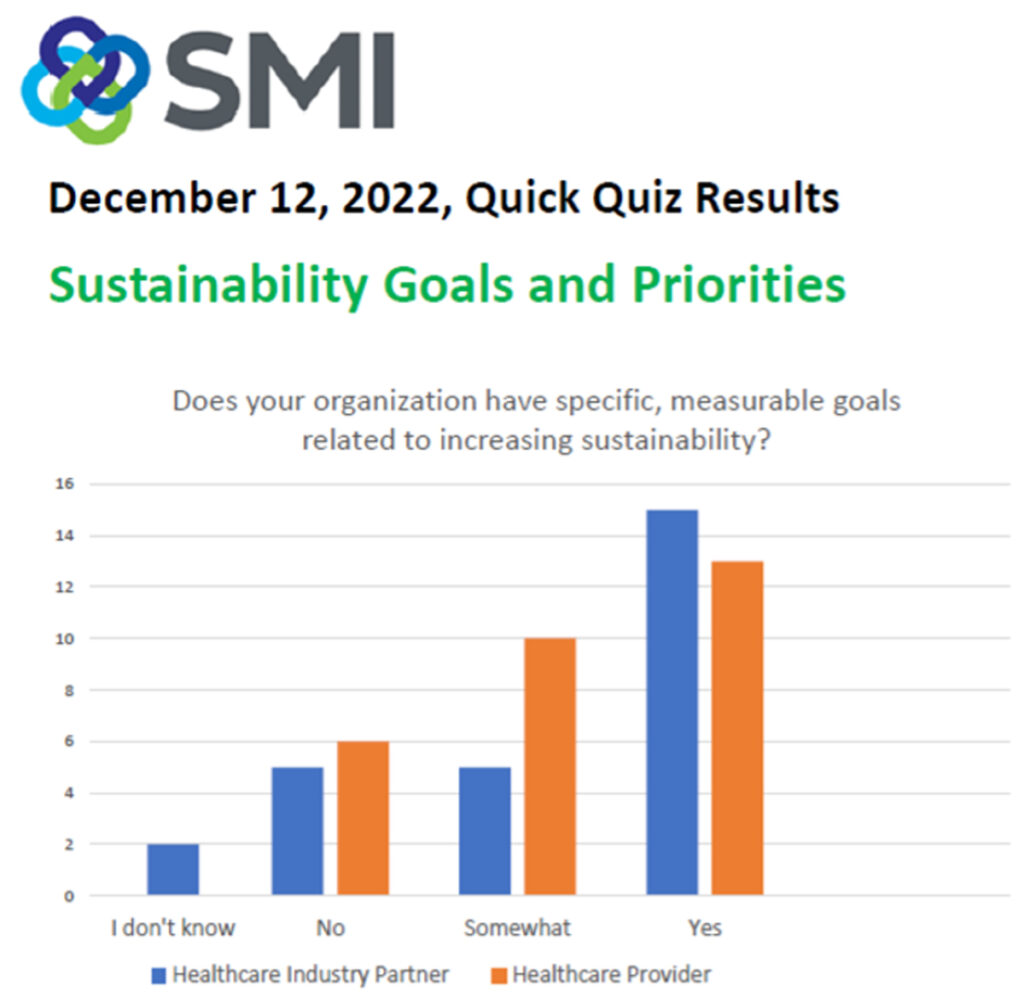March 2023 – The Journal of Healthcare Contracting
SMI®, a non-profit, member-driven community of healthcare organizations, held their Fall Forum in Scottsdale, Arizona where 200 members and invited guests discussed their top priorities for 2023. Members participated in facilitated discussions on a variety of topics affecting the US healthcare supply chain based on current challenges and future strategies. Five key priorities emerged from these conversations:
- Mitigating the impact of inflation
- Creating an agile supply chain
- Managing a remote workforce
- Driving enduring sustainability
- Increasing use of automation and artificial intelligence (AI)
Periodic Quick Quizzes collect insights from the SMI membership on a particular industry topic.

1. Mitigating the impact of inflation
The topic on most minds at the Forum was inflation with labor costs having the biggest impact followed closely by supply costs which have soared up 18% on average. As providers struggle to confront price increases, and suppliers see escalation in raw materials, labor, shipping, and other production related expenses, broadened economic value models are now essential in trading partner relationships. These models are critically important when moving to new products/services, robust value analysis processes and clinically integrating the supply chain become increasingly important components for informed supply chain decisions.
2. Creating an agile supply chain
Supply chain focus on flexibility and resiliency is critical as we move forward from the past 24 months of the pandemic. SMI members discussed the need for true patient-level demand planning with the ability to pass predictive demand signals on to the manufacturer. Members agreed that accurate and comprehensive data sharing between providers and industry partners – which is happening today between some SMI member organizations – is an imperative and will allow for improved forecasting and disaster mitigation. Members further agreed that increasing the agility of our supply chain should include prioritization of critical products based on patient outcomes, clinical use, and other key factors. The Resilience and Transparency Council within SMI is developing criteria for determining critical products which will directly impact patient care in times of volatility within the supply chain. Improved demand planning and identifying product criticality in advance of a crisis are essential elements to increase the agility of the supply chain.
Share these priorities with your leadership to begin having the critical and important conversations necessary to meet supply chain resiliency in 2023.

3. Managing a remote workforce
SMI members discussed challenges with managing a remote workforce and shared best practices that include:
- The creation of a new employee “getting to know you” questionnaire for a positive remote work orientation,
- Providing opportunities to meet peers at other facilities,
- Planning in person quarterly face-to-face meetings
- Establishing a regular cadence for virtual huddles
- Encouraging a buddy system or peer network
Members challenged each other to think about new ways to track and celebrate team members. A great example of new ways to celebrate team members: “in addition to celebrating the hero who brought in the emergency supply, celebrate the staff member who is never called up to bring in an emergency supply because they manage their PAR levels so well.”
Ruben Colon, Vice President of Strategic Sourcing at AdventHealth, who led the remote workforce discussion said, “flexible work is here to stay and requires a new and different skillset. Leaders need to be intentional about creating touchpoints to ensure connectivity, collaboration, and a sense of belonging for their team members. It is also critically important for C-suite leadership to provide clear, concise, and most of all consistent direction on when and how often employees should return to the office. Establishing clear protocols will make managing this ever-changing workforce more streamlined and rewarding allowing for improved employee retention and recruitment.”

4. Driving enduring sustainability
At the end of 2024, providers and industry partners will need to measure and report on Scope 3 emissions which shifts sustainability to a top priority in 2023. SMI members discussed the need for education on these regulations and to assist supply chain leaders as they explain competing economic and strategic priorities while having a clear message to the C-suite. Members talked about creating a dashboard that would show the economic impact of shifting dollars to address various aspects and programs such as supplier diversity, ESG, etc. SMI will continue to keep the conversation on sustainability moving forward by hosting a variety of sessions at the Spring and Fall Forums in 2023.
5. Increasing use of automation and artificial intelligence (AI)
The most forward-looking priority discussed was automation and artificial intelligence. Members discussed the importance of data standards (UDI, GS1, GTIN) for AI and automation to be successful. The healthcare supply chain currently struggles to consume the data we already have, and data standards are critical to creating meaningful and actionable information. In addition, without data standards the healthcare supply chain will continue to struggle to optimize automation and artificial intelligence – data standards are critical to our success.
These priorities remind everyone of the challenges we face together and that we still have considerable work ahead of us. Economic uncertainty, supply chain instability, the ever-evolving workforce, impending environmental regulations, and new innovations will certainly shape 2023 … how we choose to react and respond will impact the future healthcare supply chain.
To learn more about SMI and its community of members, visit: www.smisupplychain.com.
